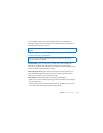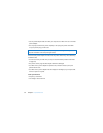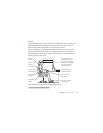62 Chapter 4 Last, but Not Least
Understanding Ergonomics
Here are some tips for setting up a healthy work environment.
Keyboard
When you use the keyboard, your shoulders should be relaxed. Your upper arm and
forearm should form an approximate right angle, with your wrist and hand in roughly a
straight line.
Change hand positions often to avoid fatigue. Some computer users might develop
discomfort in their hands, wrists, or arms after intensive work without breaks. If you
begin to develop chronic pain or discomfort in your hands, wrists, or arms, consult a
qualified health specialist.
Mouse
Position the mouse at the same height as the keyboard and within a comfortable
reach.
Chair
An adjustable chair that provides firm, comfortable support is best. Adjust the height
of the chair so your thighs are horizontal and your feet are flat on the floor. The back of
the chair should support your lower back (lumbar region). Follow the manufacturer’s
instructions for adjusting the backrest to fit your body properly.
You might have to raise your chair so that your forearms and hands are at the proper
angle to the keyboard. If this makes it impossible to rest your feet flat on the floor, use
a footrest with adjustable height and tilt to make up for any gap between the floor and
your feet. Or you can lower the desktop to eliminate the need for a footrest. Another
option is to use a desk with a keyboard tray that’s lower than the regular work surface.


















